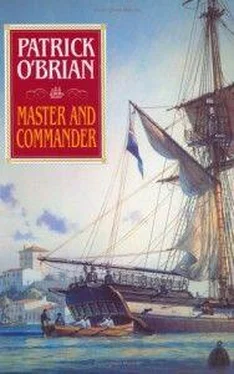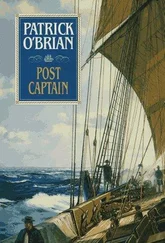'The light, Mr Ellis,' said Jack, and a blue flare soared up, designed to confuse the enemy. It was answered with Spanish signals, hoists of coloured lights, and then another gun, far over to the right. 'Topgallants,' he said. 'jeffreys, steer for that orange mark.'
This was splendid: the Sophie was running in fast, prepared, confident and happy. But the gunboats were not coming on as he had hoped. Now one would spin about and fire, and now another; but on the whole they were falling back. To stir them up the sloop yawed and sent her broadside skipping among them – with some effect, to judge by a distant howl. Yet still the gunboats moved away. 'Damn this,' said Jack. 'They are trying to lead us on. Mr Dillon, trysail and staysails. We'll make a dash for that fellow farthest out.'
The Sophie came round fast and brought the wind on to her beam: heeling over so that the silk black water lapped at her port-sills, she raced towards the nearest gunboat. But now the others showed what they could do if they chose: they all faced about in a moment and kept up a continuous raking fire, while the chosen gunboat fled quartering away, keeping the Sophie's unprotected stern towards them. A glancing blow from a thirty-six-pounder made her whole hull ring again; another passed just above head-height the whole length of the deck; two neatly severed backstays fell across Babbington, Pullings and the man at the wheel, knocking them down; a heavy block clattered on to the wheel itself as James leapt for its spokes.
'We'll tack, Mr Dillon,' said Jack; and a few moments later the Sophie flew up into the wind.
The men working the sloop moved with the unthinking smoothness of long practice; but seen suddenly picked out by the flashes of the gunboats' fire they seemed to be jerking like so many puppets. Just after the order 'let go and haul' there were six shots in quick succession, and he saw the marines at the mainsheet in a rapid series of galvanic motions – a few inches between each illumination – but throughout they wore exactly the same concentrated diligent expressions of men tallying with all their might.
'Close hauled, sir?' asked James.
'One point free,' said Jack. 'But gently, gently: let us see if we can draw them out. Drop the maintopsailyard a couple of feet and slacken away the starboard lift – let us look as though we were winged. Mr Watt, the topgallant backstays are our first care.'
And so they all moved back again across the same miles of sea, the Sophie knotting and splicing, the gunboats following and firing steadily, the old left-handed moon climbing with her usual indifference.
There was not much conviction in the pursuit: but even so, a little while after James Dillon had reported the completion of the essential repairs, Jack said, 'If we go about and set all sail like lightning, I believe we can cut those heavy chaps off from the land.'
'All hands about ship,' said James. The bosun started his call, and racing to his post by the maintopsail bowline Isaac Isaacs said to John Lakev, 'We are going to cut those two heavy buggers off from the land,' with intense satisfaction.
So they might have, if an unlucky shot had not struck the Sophie's foretopgallant yard. They saved the sail, but her speed dropped at once and the gunboats pulled away ahead, away and away until they were safe behind their mole.
'Now, Mr Ellis,' said James, as the light of dawn showed just how much the sloop's rigging had suffered in the night, 'here is a most capital opportunity for learning your profession; why, I dare say there is enough to keep you busy until sunset, or even longer, with every variety of splice, knot, service and parcelling you could desire.' He was singularly gay, and from time to time, as he hurried about the deck, he hummed or chanted a sort of song.
There was the swaying up of the new yard, too, some shotholes to be repaired and the bowsprit to be new gammoned, for the strangest grazing ricochet had cut half the turns without ever touching the wood – something the oldest seamen aboard had never yet beheld, a wonder to be recorded in the log. The Sophie lay there unmolested, putting herself to rights all through that sunny gentle day, as busy as a hive, watchful, prepared, bristling with pugnicity. It was a curious atmosphere aboard her: the men knew very well they were going in again very soon, perhaps for some raid on the coast, perhaps for some cutting-out expedition; their mood was affected by many things – by their captures of yesterday and last Tuesday (the consensus was that each man was worth fourteen guineas more than when he sailed); by their captain's continuing gravity; by the strong conviction aboard that he had private intelligence of Spanish sailings; and by the sudden strange merriment or even levity of their lieutenant. He had found Michael and Joseph Kelly, Matthew Johnson and John Melsom busily pilfering aboard the Felipe V, between decks, a very serious court-martial offence (although custom winked at the taking of anything above hatches) and one that he particularly abhorred as being 'a damned privateer's trick'; yet he had not reported them. They kept peering at him from behind masts, spars, boats; and so did their guilty messmates, for the Sophies were much given to rapine The outcome of all these factors was an odd busy restrained quietly cheerful attentiveness, with a note of anxiety in it.
With all hands so busy, Stephen scrupled to go forward to his elm-tree pump, through whose unshipped head he daily observed the wonders of the deep and where his presence was now so usual that he might have been the pump itself for all the restraint he placed upon the men's conversation; but he caught this note and he shared the uneasiness that produced it.
James was in tearing spirits at dinner; he had invited Pullings and Babbington informally, and their presence, together with Marshall's absence, gave the meal something of the air of a festivity, in spite of the purser's brooding silence. Stephen watched him as he joined in the chorus of Rabbington's song, thundering out:
And this is law, I will maintain
Until my dying day, sir,
That whatsoever king shall reign,
I will be Vicar of Bray, sir in a steady roar.
'Well done,' he cried, thumping the table. 'Now a glass of wine all round to whet our whistles, and then we must be on deck again, though that is a cursed thing for a host to say. What a relief it is, to be fighting with king's ships again, rather than these damned privateers,' he observed, a propos of nothing, when the young men and the purser had withdrawn.
'What a romantic creature you are, to be sure,' said Stephen. 'A ball fired from a privateer's cannon makes the same hole as a king's.'
'Me, romantic?' cried James with real indignation, an angry light coming into his green eyes.
'Yes, my dear,' said Stephen, taking snuff. 'You will be telling me next about their divine right.'
'Well, at least even you, with your wild enthusiastic levelling notions, will not deny that the King is the sole fount of honour?'
'Not I,' said Stephen. 'Not for a moment.'
'When I was last at home,' said James, filling Stephen's glass, 'we waked old Terence Healy. He had been my grandfather's tenant. And there was a song they sang there has been in the middle part of my mind all day – I cannot quite bring it to the front, to sing it.'
'Was it an Irish song or an English?'
'There were English words as well. One line went Oh the wild geese a-flying a-flying a-flying,
The wild geese a-swimming upon the grey sea.'
Stephen whistled a bar and then, in his disagreeable crake, he sang
'They will never return, for the white horse has scunnered
Has scunnered has scunnered
The white horse has scunnered upon the green lea.'
'That's it – that's it. Bless you,' cried James, and walked off, humming the air, to see that the Sophie was gathering the utmost of her strength.
Читать дальше
Конец ознакомительного отрывка
Купить книгу












